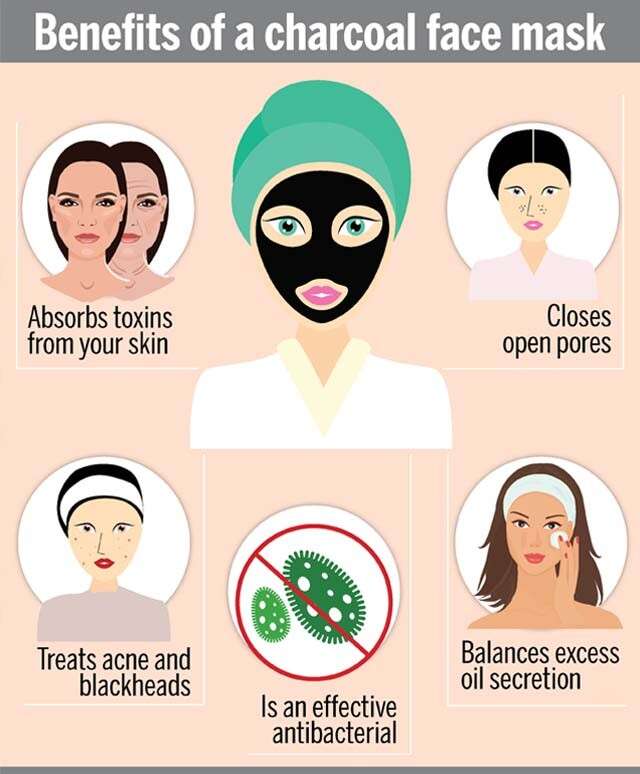Benefits of Charcoal Masks
Charcoal masks have gained popularity in recent years, thanks to their numerous benefits for the skin. These masks are known for their ability to draw out dirt, pollutants, and impurities, making them an excellent choice for those exposed to pollution or sunlight regularly. In addition, charcoal masks help prevent clogged pores, a common issue during humid weather.
One of the main advantages of charcoal masks is their ability to control sebum production. This helps prevent acne and skin breakouts, making them a popular choice for those with oily skin. Moreover, the antibacterial and antifungal properties of charcoal improve acne and other bacterial skin conditions.
Activated charcoal is a natural ingredient that contains no chemicals and is gentle on the skin. This makes charcoal masks suitable for most skin types. They also have detoxifying and exfoliating properties, leaving the skin smooth, healthy, and radiant.
Another benefit of charcoal masks is their ability to remove whiteheads and blackheads by deep cleansing the pores. They also mattify oily skin and minimize the appearance of pores.

For those who prefer a more natural approach, DIY charcoal masks can be made using ingredients like coconut oil, baking soda, and rice flour.
Charcoal masks are not only beneficial for removing harmful impurities from deep inside the skin but also for soothing and brightening the skin due to their antibacterial and anti-inflammatory properties. This makes them an excellent choice for those looking to improve their overall skin health.
However, it is essential to use charcoal masks wisely and only once a week to prevent skin damage. For those who prefer a different type of mask, sheet masks are a great alternative. These masks are soaked in a blend of nutrients enriched with active ingredients targeting different skin issues. Garnier offers a range of charcoal masks and sheet masks for various skin concerns.
In summary, charcoal masks offer numerous benefits for the skin, making them a popular choice for many. By using them wisely and following proper guidelines, one can enjoy the positive effects of charcoal masks without any harm to their skin.
Potential Side Effects of Charcoal Masks
Charcoal masks have gained popularity for their ability to detoxify the skin and remove impurities. However, using them improperly or choosing the wrong product can lead to some serious side effects.
Damage from Improper Use
Peel-off masks, including charcoal masks, can cause permanent damage to the skin if chosen improperly. It is essential to select masks that suit your skin’s needs and type, or else they can do more harm than good. People with darker skin tones, like black patients, Asians, and Hispanics, are more susceptible to permanent hypo-pigmentation from charcoal masks.
Risks of Unregulated Products
Purchasing charcoal masks from unregulated online stores might cause negative skin effects, like scarring and enlarged pores. Be cautious when buying any skincare product online, as there might not be regulations like American brands. Skin experts warn against the risks of using charcoal masks, especially for those with darker skin tones who have higher chances of getting hypo-pigmentation.

Overuse and Irritation
Excessive use of charcoal masks can dry out the skin, leading to redness, irritation, and more blemishes. Overuse of any skincare product can harm the skin, especially if it’s not suitable for the person’s skin type. If you experience pain or discomfort while using a charcoal mask, it’s best to consult with a professional esthetician or a dermatologist.
Activated Charcoal Quality
Activated charcoal can detoxify the skin by removing pollutants and impurities, but it may not always be activated enough to work effectively. Regular charcoal used for barbecuing is not the same as activated charcoal used in beauty products. Make sure to choose products with high-quality activated charcoal for the best results.
To avoid potential side effects, it’s crucial to use charcoal masks safely and choose products from reputable sources. Always consider your skin type and needs, and consult with a professional if you experience any discomfort or adverse effects.
How to Use Charcoal Masks Safely
Charcoal masks have gained popularity for their ability to absorb impurities and excess oils from the skin. However, using them safely is crucial to avoid any potential harm to your skin. Here are some tips and guidelines to help you make the most of your charcoal mask experience without causing any damage.
Follow the Product Instructions
Always read and follow the instructions provided on the packaging of your charcoal mask. Different products may have specific application and removal methods. Generally, charcoal masks should only be used once or twice a week to avoid over-drying the skin. Overuse can lead to skin irritation and other issues.
Patch Test Before Use
Before applying a charcoal mask to your entire face, perform a patch test on a small area of skin, preferably behind the ear or on the inner arm. This will help you determine if you have any allergies or sensitivities to the product. If you experience any redness, itching, or irritation, discontinue use immediately.
Avoid Sensitive Areas
When applying a charcoal mask, be sure to avoid sensitive skin areas like the eye area, nostrils, and lips. These areas are more prone to irritation and can be damaged by the mask’s potent ingredients.

Choose the Right Product
Select a charcoal mask that suits your skin type and specific needs. Some popular options include Love Earth, Blu Atlas, and Every Man Jack. Remember that men can also benefit from using face masks, and there are plenty of options available specifically formulated for them.
Consider Alternatives
If you find that charcoal masks are not suitable for your skin, consider trying clay masks instead. They offer similar benefits, such as managing dry skin and preventing acne. Some popular clay mask options include Dead Sea Mud Mask and Kiehl’s Avocado Nourishing Hydration Mask. However, be aware of potential side effects like dryness, itchiness, redness, and rash, and limit use to once a week.
In summary, using charcoal masks safely involves following product instructions, patch testing, avoiding sensitive areas, and choosing the right product. By following these guidelines, you can enjoy the benefits of charcoal masks without causing harm to your skin.
Alternatives to Charcoal Masks
If you’re looking for alternatives to charcoal masks, there are various types of face masks available in the market that cater to different skin concerns. These include clay, jellied, peel-off, sheet, and overnight masks. Each type offers unique benefits, and it’s essential to choose one that suits your skin type and needs.
Clay Masks for Oily Skin
Clay masks are an excellent alternative for those with oily skin. They help absorb excess oil and clear clogged pores, leaving your skin feeling refreshed and clean. One popular clay mask option is Fuller’s Earth, a natural clay mask that offers skin refreshment and a glowing appearance. It is also used to combat summer-related skin problems. You can find clay masks at affordable prices at retail locations like Dollar Tree.

Hydrating Masks for Dry Skin
For those with dry skin, masks containing hyaluronic acid, honey, glycerin, shea butter, or ceramides can provide much-needed hydration. These ingredients help retain moisture and nourish the skin, leaving it soft and supple.
Soothing Masks for Sensitive Skin
If you have sensitive skin, look for masks with soothing ingredients such as hyaluronic acid, aloe, chamomile, green tea, niacinamide, or cucumber extract. These ingredients help calm irritation and redness, providing relief to your delicate skin.
DIY and Vegan Face Masks
For a more natural and sustainable approach, consider making your own DIY face mask using ingredients like honey, yogurt, or oatmeal. You can also create a coffee face mask by mixing coffee powder with honey, milk, aloe vera gel, or sugar and oil. Alternatively, opt for vegan face masks crafted with plant-based ingredients, which provide a natural and eco-friendly alternative to commercial products.
As the beauty facial mask market continues to grow, with an increasing demand for natural and organic skincare products, it’s essential to explore different options and find the one that best suits your skin type and concerns. Remember to always follow the instructions and precautions for each mask to ensure safe and effective use.
